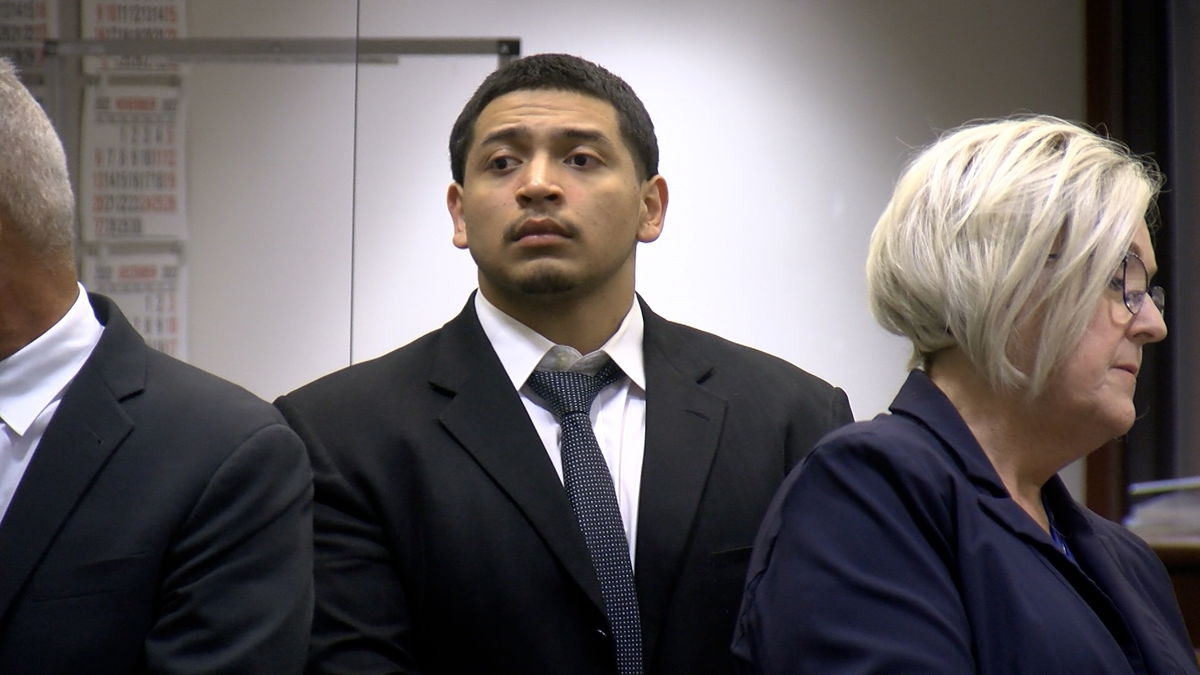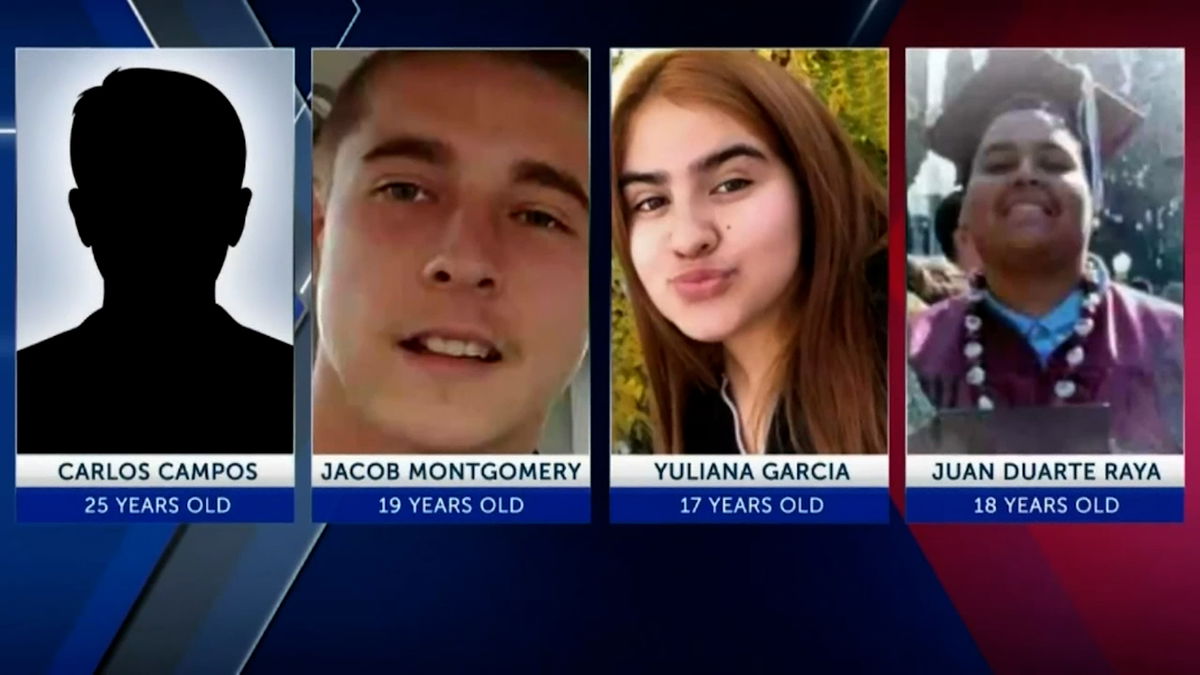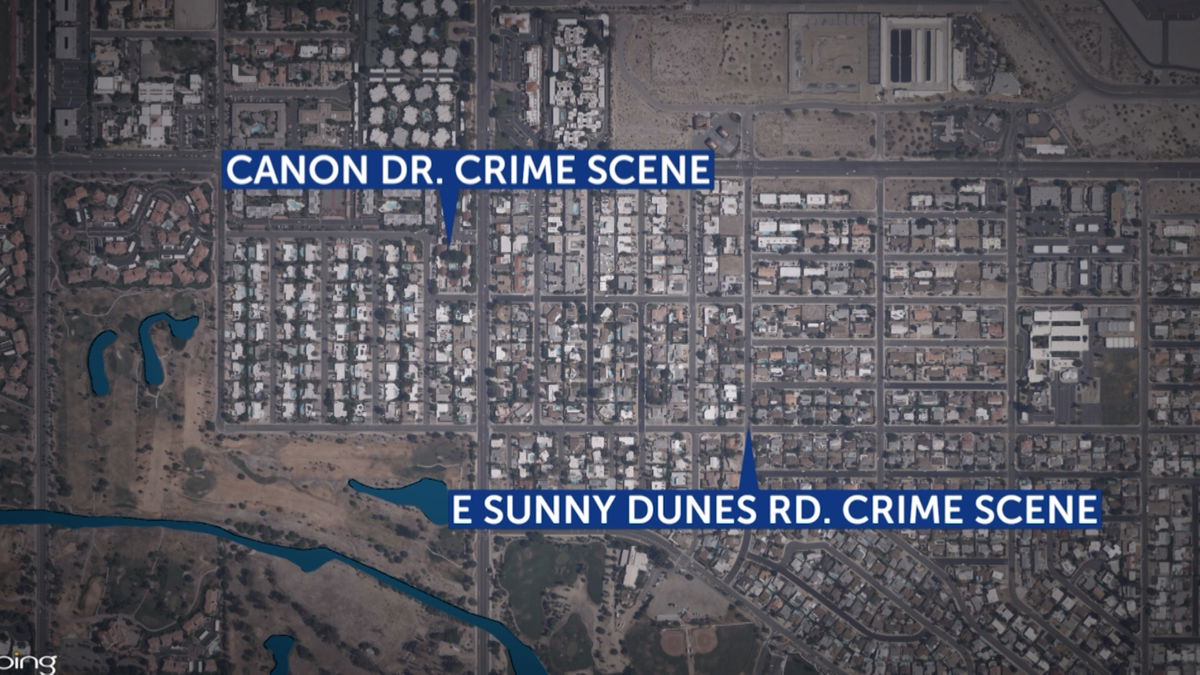Palm Springs quadruple murder retrial: more defense cross-examination Wednesday
The prosecution continued poking holes in a defense expert's testimony Wednesday in the Palm Springs quadruple murder retrial for Jose Larin Garcia.
Larin Garcia is accused of murdering four people in Palm Springs in 2019. His first trial ended with a deadlocked jury.
In a pointed cross examination, Deputy District Attorney Samantha Paixao has questioned defense crime scene re-constructionist Randolph Beasley for several days in a row.
Beasley's testimony centered around attempting to prove to the jury there could have been a third person, the real killer, in the back seat of the murder vehicle, a 1997 Toyota Corolla.
The expert faced questions on a re-enactment he did in Nov. 2021, sitting inside the tight back seat of the Corolla and presenting to the jury photos of his knees scrunched up.
Beasley pointed out the front seat in those photos appeared to have moved positions compared to photos taken the night of the murders. By his estimate, it was a difference of about 5 inches.
In this demonstration, a Palm Springs Police Dept. detective played the role of Larin Garcia, who was 311 pounds the night of the murders.
Beasley outfitted the detective with a pillow inside his protective suit to better mimic the suspect's weight. The prosecutor said the two do not equate.
The expert said his conclusion was not impacted by these factors, but admitted the crime scene re-construction he presented to the jury was photographed with an "inaccurate" seat position.
BACKGROUND:
Jose Larin Garcia, a Cathedral City man, is accused of killing four people (ages 17-25): Carlos Campos, Jacob Montgomery, Yuliana Garcia and Juan Duarte Raya nearly four years ago.

The four victims were all found shot and killed on the night of February 3rd, 2019.
Three of the victims were found inside a car that crashed at Sunny Dunes and El Placer roads. The fourth victim was discovered in the street on Canon Dr. few blocks away.

When police arrived on scene, they found Larin Garcia hiding under a truck. They say he appeared intoxicated and covered in blood.
Larin Garcia was taken to Desert Regional Medical Center for treatment. Security footage shows him running from the hospital later that night.

Detectives have testified he then went to a friend’s house who he had buy him a one-way bus ticket to Florida using a fake name. Prosecutors say he was preparing to flee – shaving his head and beard to change his appearance. He was arrested waiting at the bus stop.
Larin Garcia is charged with four counts of murder. He also faces a special-circumstance allegation of committing multiple murders, opening him to the death penalty if convicted.
WEEK 10 IN COURT:
A judge ruled defense crime scene re-constructionist Randolph Beasley would be allowed to testify before the jury.
New details were revealed about a jail security incident involving suspect Jose Larin Garcia tampering with a lock.
Beasley aimed to recreate the crime scene on the courtroom floor.
The reconstruction's goal was to prove three people could have fit in the back seat of the Toyota Corolla in this case.
WEEK 9 IN COURT:
The defense called two Palm Springs Police Department employees to the stand to explain why audio recordings from the night no longer exist.
The judge denied a defense motion to acquit the defendant.
WEEK 8 IN COURT:
A DNA expert continued testimony about apparent blood swabbed from key pieces of evidence.
The prosecution's blood stain pattern interpreter testified about calculating the victims' positions in their final moments.
The prosecution rested its case.
WEEK 7 IN COURT:
After about a month off from the trial, the judge gave consideration to a defense request for a mistrial due to new evidence being discovered nearly four years after the crimes.
The mistrial was ultimately denied and the most incriminating piece of evidence was excluded.
The jury returned and testimony continued with a DNA expert.
WEEK 6 IN COURT:
A Palm Springs detective testified about finding a variety of ammunition in Larin Garcia's bedroom.
The judge excused the jury for nearly a month after new, incriminating evidence previously thought to be lost was discovered.
WEEK 5 IN COURT:
A forensic toxicologist testified about whether drugs or alcohol were detected in the victims' blood samples. A fingerprint examiner who processed seven 9mm bullet casings in this case said he did not find any fingerprints on them.
A DOJ criminalist and weapons expert told the jury after examining the bullet casings from the scene that she believes they were all fired from the same weapon.
Jurors heard an hours-long recording of the undercover operation in Larin Garcia's jail cell.
An undercover agent gave testimony about what Larin Garcia told him while he was posing as an inmate in jail.
WEEK 4 IN COURT:
A friend of Larin Garcia's told the jury that the defendant showed him a gun and threatened to kill someone just days before the murders.
A PSPD detective testified about evidence she collected from the scene and security video she retrieved of Larin Garcia running out of the hospital.
A girlfriend of one of the victims' spoke about showing police Facebook messages sent the night of the murders regarding the fentanyl drug deal at the heart of these murders.
The man the defense says claimed responsibility for the murders testified he did not kill the four victims in this case.
WEEK 3 IN COURT:
Last week, a family friend who harbored Larin Garcia after he fled the from the hospital testified. The jury also heard from the investigator who arrested him later that night at an Indio bus stop.
Larin Garcia's mother took the stand, revealing he called her the night of the murders and she brought him clothes and a cell phone after he ran from the hospital.
Medical examiners testified the victims were all killed instantly by gunshot wounds to the head.
A friend of the defendant spoke about a key phone call she got from the defendant just after the murders happened.
WEEK 2 IN COURT:
The jury heard from a police investigator and a friend of some of the victims.
A hospital nurse who treated Larin Garcia as a trauma patient the night of the murders testified he ran from the emergency department.
A Palm Springs police officer gave testimony key to the defense argument that another man carried out the shootings.
The jury was brought on-location to the scene of the crimes.
WEEK 1 IN COURT:
During opening statements, prosecutor and Deputy District Attorney Samantha Paixao asked the jury to hold Larin Garcia responsible for the four lives she said he stole.
Defense attorney John Patrick Dolan argued that another man, John Olvera, was responsible for the murders.
The jury heard from some of the first people on scene after the murders, including neighbors who saw the dead bodies and the police officer who first made contact with the suspect.
